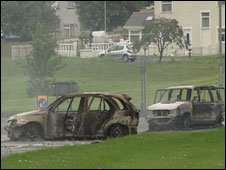BEHIND RIOTS’

Serious rioting broke out this week in Belfast and in County Armagh, where clashes between republican youths and the PSNI police saw a blast bomb thrown and shots fired.
The trouble at Craigavon was the most serious, with the PSNI reporting that a blast-bomb and a shotgun had been used in two days of conflict with republican youths in County Armagh town.
The PSNI came under attack from youths during raids in the Tullygally, Brownlow and Drumbeg areas of the town, leading to full-scale riots.
Several cars were hijacked and torched during the rioting, while police Land Rovers also came under attack from petrol bombs, stones, bottles and other missiles.
PSNI Deputy District Commander Alan McCrum said the shooting incident took the days events to “another level” and claimed it “was a deliberate attempt to murder my officers”.
Prominent local republican and local eirigi representative Colin ‘Collie’ Duffy said the PSNI had been abusive towards local nationalists and that the force was not acceptable.
“I witnessed first-hand when the PSNI came on to the Tullygally and Drumbeg estates and assaulted women and children,” he said.
“The resistance that followed was a symptom of the fact that people are not prepared to accept the British occupation in Ireland in the shape of the PSNI/RUC.”
He said eirigi was gathering more and more support among ordinary nationalists.
“Certain political parties claim that they’re making the PSNI accountable by taking up places on the Policing Board but people on the ground will never accept them.
“There are still 5,000 British troops here, while MI5 is building its headquarters at Palace Barracks.”
John O’Dowd, the Sinn Féin assembly member for the area, said the rioting had been orchestrated by a small group of individuals “who have no support in the area”. He urged them to disengage or lives would be lost.
He also called on eirigi to explain its policy on the future of policing in Ireland.
“When dismissing one approach there is a duty on political parties, including eirigi, to offer an alternative.”
He also pointed out that, in the most recent Assembly election, rival republicans gained 300 votes in the area, against 11,000 for Sinn Féin.
Republican Sinn Féin “congratulated” the people of Craigavon “for their resistance to Crown Forces who had saturated the area”.
Director of Publicity, Richard Walsh, said: “Nationally-minded people in Craigavon have shown that they are neither purchased nor intimidated.
“They are to be congratulated for all manner of resistance which they have offered to the British Crown Forces in Brownlow, Tullygally and Drumbeg following RUC incursions into the areas.”
Meanwhile in nearby Lurgan, a protest outide a meeting of the Policing Board turned violent. SDLP Policing Board member Dolores Kelly said she was struck by a stone as she made her way to a car after a meeting yesterday, and that her car windscreen was smashed.
She described events in Craigavon as “deeply worrying and sinister”.
“This is not spontaneous violence. It is not recreational rioting. It is part of an organised and violent strategy,” she said.
In south Belfast, the nationalist Markets area came under missile attack by loyalists in south Belfast on Monday.
The clashes quickly escalated with the arrival of the PSNI, and petrol bombs and stones were thrown.
Shortly afterwards nationalist youths from the Short Strand area in the east of the city also attacked the PSNI who became engaged in sectarian clashes.
Unusually, there was also reports of trouble between loyalist youths and the PSNI in the lower Newtownards Road area.
Sinn Féin’s Niall O’Donnghaile the problem had been ongoing for several nights on both sides of the interfaces in east Belfast.
“This activity must stop. Young people need to know the very real dangers involved in this sort of behaviour and both communities are opposed to this and want to see it stop.”
Pointing out that Sinn Féin was working to stop the rioting, he said: “The community in the Short Strand does not want this and those engaged in this activity on the interface are not reflective of this community.”
There were also clashes on Wednesday evening in Derry, where youths threw stones and petrol bombs at PSNI patrols in the predominately nationalist city.
Meanwhile, the PSNI’s first use of a Taser stun-gun has sparked debate on appropriate force. The potentially lethal weapon was first issued to PSNI members at the start of the year.
It was used in Derry last weekend to subdue a father who had locked himself in a house with his two young children.
Patrick Corrigan from Amnesty International expressed concern that the first use of the weapon could be the start of “a slippery slope towards further arming of the police with Tasers”.
![[Irish Republican News]](https://republican-news.org/graphics/title_gifs/rn.gif)
![[Irish Republican News]](https://republican-news.org/graphics/title_gifs/harp.gif)

